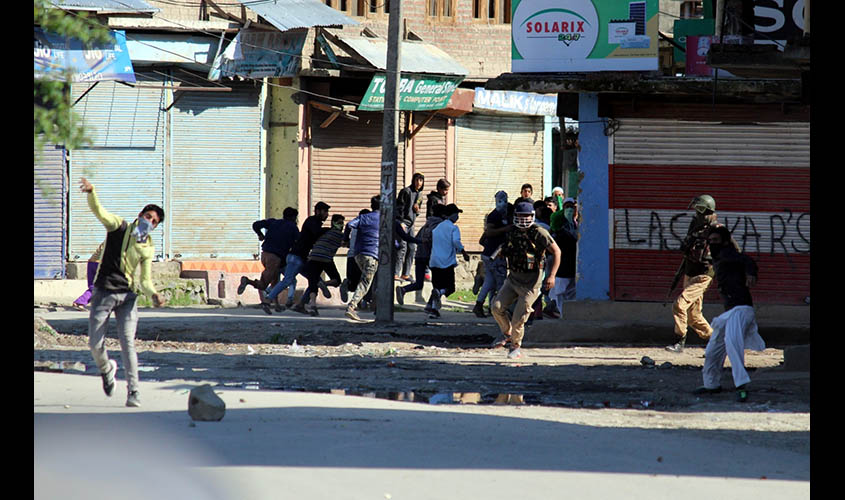The political space in the state is almost vacant, with a collapsing economic situation and disenchanted youths.
We all Indians—of course, Kashmiris too—are worried about peace and are hoping for stability to prevail in Kashmir. Dialogues with various stakeholders in the valley, which is burning for the last thirty years or so, even though reported to have taken place, have yielded no result. The blame for which goes to civil society, academicians, journalists, diplomatic missions and representatives of different communities. The political space in the state is almost vacant, with a collapsing economic situation and disenchanted youths. The role of media, both regional and national, since 1998, too has come under scrutiny for overstepping its boundaries and sensationalising issues.
The responsibility for the present situation in the valley, which is far from normal, rests on both the state and Union governments, as politicians from both these governments have mishandled their reach-out to the youths of the valley since 2016. This has alienated Kashmir to a great extent, particularly due to the failed governance of the PDP-BJP coalition in the state.
The state political leadership has closed its eyes when it comes to the economic development of the state and prioritised their personal agendas. Kashmir has a huge potential of horticulture, floriculture, apiculture and adventure tourism to generate employment. There was some hope that after the elimination of Burhan Wani, these four means of employment generation would become the top priority for the state government to engage with the educated unemployed youths. Instead, it was corruption that became the top priority when it came to cases of land acquisition and gaining licences for various small businesses.
Public sector unemployment grew in direct proportion to the lack of skill development. Neither civil society nor any government agency has come forward to channelise the youth energy. Students passing out from Kashmir University have remained restless due to the absence of placement firms for campus selection.
What was required was a political process between Kashmir and the rest of India, silencing Pakistani elements and a strong interaction between Kashmiri Muslims and Kashmir Pandits. However, that has not happened. The Kashmir agenda of PDP-BJP led government has not helped the state in moving forward.
The need of the hour is people to people connectivity, greater public/private sector investment, proper environment for Kashmir youths in other universities in India, inter community harmony and zero tolerance on human rights violence.
Trust building factors towards Kashmiri youths need more attention, including intra Kashmir dialogues among the civil societies of Kashmir, Jammu and Ladakh to bridge the gap. The main aim should be on turning the narration from azaadi to vikash. The opening of the vital Kargil-Skardu road is another issue which cannot be kept in the wastepaper basket for long.
Not only should the government focus on increasing the interaction between the people of Kashmir with the rest of India, but it cannot also avoid the Pakistan angle since it is our neighbour and will remain as our neighbour. We have to introspect on our approach towards Pakistan, may be bilaterally or with the intervention of the United States.
Kashmiri civil society should try to first cultivate a proper climate for discussion and involve both the state government and Government of India to come up with a warm welcome for Kashmiris and their culture. The dialogue must be planned after thorough introspection, combining the will of the the rest of Indians, but without any hatred towards Kashmiris, as sometimes seen towards the people of the Northeast. What is missing is the counselling of the youths. It is the duty of the parents, media, politicians and civil society, so also, to some extent, the local government to make sure that the youths are brought into the mainstream.
Whether or not any dialogue is needed with the Hurriyat leaders is a debatable topic. Yet all options must be kept open and Hurriyat leaders including the women’s wing leader, Asiya Andrabi must be clearly briefed to come forward, within the bounds of the Constitution of India and without asking Pakistan to meddle, as it is India’s internal security matter.
All other stakeholders, including representatives of Kashmir, Jammu, Ladakh, politicians, civil society and youth leaders including that of Hizbul Mujahideen’s Indian leaders, should be persuaded to meet on a common platform after having an intra dialogue within them.
A very hard stand by the Centre will never succeed in countering the creeping sway of radical Islamism in Kashmir and bring the stone-pelters to the mainstream. Kashmiri traders, particularly shawl traders, carpet weavers and apple orchard owners need to be given priority because their market is not only in India, but abroad too. The Kashmiri students who cleared the IAS examination recently should be taken as role models for Kashmiri youths. Entrepreneurial schemes, finding sports talents, planning of job opportunity for Kashmiri youths, establishing an IT hub in Kashmir University, including setting up of placement agencies of various industries/firms are some of the requirements.
The revival of erosion of political spaces of both the State and the Centre needs to be countered. Time is ripe for the Central government to consider the shifting of Rohingyas from Jammu and Ladakh to the eastern borders, as some of them are conduits of Al Qaeda and ISIS. On the whole, education, economic development and well-being of the local citizens appear to be the axis for achieving a solution. Let, us, rest of Indians, give Kashmiris connectivity, but not azaadi.
P.K. Mishra is a retired Additional Director General of the Border Security Force

